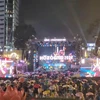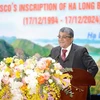Wearing colourful costumes and wonderful masks, artists from the Republic of Korea (RoK) thrilled Vietnamese audience with performances of a traditional dance, Talchum, on August 16 to mark the nation's culture week at the Vietnam Women's Museum.
Made from wood, pasteboard, feathers and dried gourds, the masks reflect the faces of people, gods and animals.
Through masks and dance, the artists told tales relating to life and production and sent messages to the gods for prosperity and happiness.
Fourteen artists from Jeju Doorunanum folklore art troupe also performed Pungmul (peasants' dance), which is often performed in spring.
For seven days, visitors will get the chance to learn about the dances through an indoor exhibition of photos, musical instruments, costumes, masks and props. Musicians will also offer dance and drum lessons.
Visitors can also learn how to make masks and try on Korean costumes.
During the festival, visitors can try Korean food such as kimchi, gimbab (rice rolled with beef and vegetables) and tokbokki (made from soft rice cake, fish and sweet red chilli sauce).
"RoK is a developed country with a dynamic and modern culture," said Park Nark-jong, director of the Korean Cultural Centre. "We still possess a unique, age-old culture that has been developed over thousands of years."
"Modern RoK culture, such as K-pop, is wildly popular with young Vietnamese, but this is the first time traditional culture has been performed on a large scale," said Park.
"We are not professional artists, we are ordinary Koreans, that's the reason why I think we can communicate easily with Vietnamese people and share our heritage," leader of the troupe Shim Kyo-ho said.
The RoK Culture Week is ongoing at the Vietnam Women's Museum, 36 Ly Thuong Kiet street, Hanoi until August 23.-VNA
Made from wood, pasteboard, feathers and dried gourds, the masks reflect the faces of people, gods and animals.
Through masks and dance, the artists told tales relating to life and production and sent messages to the gods for prosperity and happiness.
Fourteen artists from Jeju Doorunanum folklore art troupe also performed Pungmul (peasants' dance), which is often performed in spring.
For seven days, visitors will get the chance to learn about the dances through an indoor exhibition of photos, musical instruments, costumes, masks and props. Musicians will also offer dance and drum lessons.
Visitors can also learn how to make masks and try on Korean costumes.
During the festival, visitors can try Korean food such as kimchi, gimbab (rice rolled with beef and vegetables) and tokbokki (made from soft rice cake, fish and sweet red chilli sauce).
"RoK is a developed country with a dynamic and modern culture," said Park Nark-jong, director of the Korean Cultural Centre. "We still possess a unique, age-old culture that has been developed over thousands of years."
"Modern RoK culture, such as K-pop, is wildly popular with young Vietnamese, but this is the first time traditional culture has been performed on a large scale," said Park.
"We are not professional artists, we are ordinary Koreans, that's the reason why I think we can communicate easily with Vietnamese people and share our heritage," leader of the troupe Shim Kyo-ho said.
The RoK Culture Week is ongoing at the Vietnam Women's Museum, 36 Ly Thuong Kiet street, Hanoi until August 23.-VNA



















